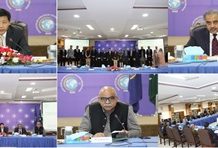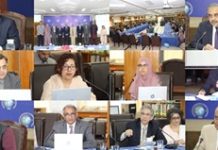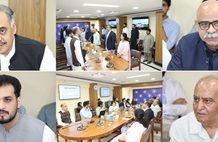Afghanistan’s revival and its future progress would largely depend on regional cooperation that the Afghans may consider as the core principle of their foreign policy. This would transform Afghanistan from an area of geopolitical contestation to a zone of opportunity
Never has Afghanistan seen so much positive involvement of the international community in its reconstruction as has been the case since the ouster of the Taliban regime. But it is important for the Afghans to understand what brought so much assistance to them, and how long it will last.
It was not poverty or mass dislocation of population inside and outside the country or even the civil war that turned the attention of the West and its regional allies towards their country. It was the negative side of Afghanistan, its having become a safe haven for trans-national terrorist networks and a source of terrorism and insecurity for the region that made the world finally change its attitude from benign neglect to active participation in Afghanistan’s economic and political reconstruction.
Although the international interest in reviving Afghanistan as a functional and effective state is born out of fear and anxiety about a failed state on the crossroads of three strategic regions, it is nevertheless genuine, well meaning and constructive.
It is also true that without international assistance Afghanistan cannot hope to develop itself into an effective state and nation. Its material resource base including land, water and natural resources are either too poor or unexplored and underdeveloped to sustain the country’s revival. Its human resource in education, bureaucracy and other state institutions has withered away because of the destructive war. Sustainable international assistance is therefore vital for Afghanistan to recover its lost social and economic energies.
However, while recognising the significance of international involvement in Afghanistan, we need to be aware of two caveats. First, the reconstruction programme should be aimed at helping Afghans to help themselves. Some of the programmes, like the ring road connecting all outlying provinces, rehabilitation of irrigation channels, plans for hydro-electric plants, and investment in the social sector are geared towards that end. The objective should be to tap local Afghan resources and reduce dependence of the country on external assistance, which at the moment seems unrealistic given the massive cost of rebuilding the country.
Another aspect demanding caution relates to the neo-liberal framework underlying economic reconstruction. Uncritical application of market-based economic models to a poverty-stricken Afghanistan may cause inequality of incomes and concentration of legal and illegal wealth in those sectors of the society that dominate its political life and create a large rent-seeking class. There is a clear bias in the reconstruction in favour of private groups and companies that limits the sphere of the state.
This is not entirely due to the weak capacity of the state to provide effective and transparent governance in managing reconstruction programmes; what really shapes the policy of the donors is ideological scepticism about the ability of the modern state to provide services efficiently. The market-oriented reconstruction may spur growth, which is necessary, but could leave the vast majority of poor without social safety nets. In conditions of social anarchy that exist on the periphery of the Afghan state, old and new enemies may exploit popular anger and turn it against the state and the emerging rapacious elites. This may prove counter-productive to the objective of establishing positive and deep linkages between the state and society which, in any case, have been historically week.
The Afghan have to be urged to stand on their own feet, as Hamid Karzai in one of his speeches to an assembly of elders said in June 2007. International support and sympathy for their country has come about in unusual circumstances that may not last forever. Donors get fatigued or turn to new causes when they are drawn towards more demanding events. Countries like Afghanistan slide down on their ladder of the hierarchy of interests and priorities. How best the Afghans can take advantage of international support to be stable, peaceful and unified would largely depend on their own vision and social capacity to reconcile differences among them.
For far too many years and too often with repetitive boredom they have accused others, particularly intervention by their neighbours for their woes. But the narrative of victimisation by external enemies is only partially credible. Afghans must take responsibility for their own follies and admit their own hand in the making of the Afghan tragedy from a self-destructive socialist revolution to the civil war. Their perpetual infighting at every turn of events has earned them an unfortunate image: that Afghans know only one thing how to fight.
This must change. Perhaps they need to evolve a new social contract that outlaws war as a means of settling disputes. There are peaceful alternatives, and one can find a lot in the traditional institutions and norms of Afghanistan, to reconcile differences. After the overthrow of the Taliban, the country has a better governance framework, with a constitution, an elected legislature and provincial councils that can be used as forums to pursue reconciliation as a political objective and settle differences over the sharing of power.
Afghanistan’s neighbours have frequently fished into the troubled waters of Afghanistan and transferred their own conflicts and rivalries to that country. The fragmentation among the Afghan groups and their violent struggle for power pushed them to seek patronage of the external powers. The presence of the United States and NATO forces has severed, but not entirely eliminated, horizontal linkages of the Afghan groups to some degree. As the Afghans create greater consensus among them and resolve their problems over power sharing and other issues, the menacing role of neighbour may get diffused over time.
One important way the Afghans can better handle their neighbours is by rethinking their place and role in the complex geopolitical system of their region. They may recast their foreign policy in a framework that would alleviate the fears of one neighbour using Afghanistan for hostile purposes against another and contain their ambitions by denying the use of Afghanistan as an arena for a new ‘great game’.
This framework must rest on two pillars: neutrality and cooperation with all the neighbours. It would be prudent for the Afghans to redefine Afghanistan as a neutral state. Neutrality will not lessen Afghanistan’s statehood; it will rather remove apprehensions of countries like Pakistan and contain the ambitions of all the neighbours. It will also restore the historic personality of Afghanistan as a buffer, but with a different definition and value than is required by the strategic need of the old European empires that were fearful of touching each other’s colonial boundaries.
Afghanistan’s revival and its future progress would largely depend on regional cooperation that the Afghans may consider as the core principle of their foreign policy. This would transform Afghanistan from an area of geopolitical contestation to a zone of opportunity.
Afghanistan occupies a central position and can emerge as a transit commercial state that would give positive meaning to its buffer status. It can be a meeting point for regional trade, serve as a corridor for energy resources and provide an opportunity to all for investment in its infrastructure and exploration of mineral resources.
The author is a professor of Political Science at the Lahore University of Management Sciences.













